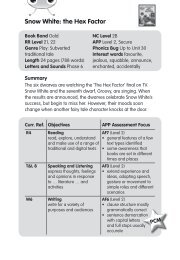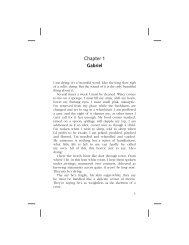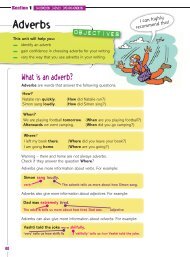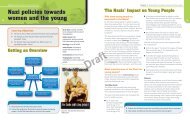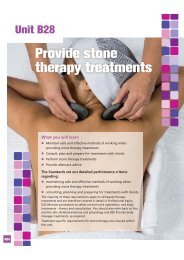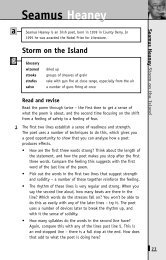Unit 1 Developing effective communication in health and social care
Unit 1 Developing effective communication in health and social care
Unit 1 Developing effective communication in health and social care
You also want an ePaper? Increase the reach of your titles
YUMPU automatically turns print PDFs into web optimized ePapers that Google loves.
BTEC Level 3 National Health <strong>and</strong> Social Care<br />
<strong>Unit</strong> 1 <strong>Develop<strong>in</strong>g</strong> <strong>effective</strong> <strong>communication</strong> <strong>in</strong> <strong>health</strong><br />
<strong>and</strong> <strong>social</strong> <strong>care</strong><br />
Types of <strong>in</strong>terpersonal <strong>in</strong>teraction<br />
Test your <strong>communication</strong> skills. Look at the faces below <strong>and</strong> decide what each character is feel<strong>in</strong>g. Compare<br />
your answers to those given by other members of the group. Do you agree?<br />
Mirror<strong>in</strong>g, or reflective listen<strong>in</strong>g, is an <strong>effective</strong> way to show people that you are really listen<strong>in</strong>g.<br />
With a partner or friend practise reflective listen<strong>in</strong>g. One person speaks <strong>and</strong> the other must mirror their actions<br />
<strong>and</strong> their words. Do not make it obvious that you are do<strong>in</strong>g this. You can say th<strong>in</strong>gs like:<br />
‘So are you say<strong>in</strong>g that…?’<br />
‘Have I heard you correctly? Did you say…?’<br />
‘You’re look<strong>in</strong>g very sad. Do you feel sad?’<br />
Ask your partner for feedback. Were you be<strong>in</strong>g too obvious? Did you put your partner at ease?<br />
Did they feel that they wanted to open up <strong>and</strong> share more with you?<br />
Slang is language outside conventional usage. Use the table below to decide the mean<strong>in</strong>g of each of the words<br />
<strong>and</strong> then compare your answers to your friend’s answers.<br />
Slang word Your <strong>in</strong>terpretation Your friend’s <strong>in</strong>terpretation<br />
Sad<br />
Cushy<br />
Ace<br />
Sick<br />
Savvy<br />
1. Th<strong>in</strong>k of a word or two of your own <strong>and</strong> ask your partner for their <strong>in</strong>terpretation of it.<br />
2. Did you both agree on all the words? If not, why do you th<strong>in</strong>k you had different answers?<br />
3. Why do you th<strong>in</strong>k it is important not to use slang with<strong>in</strong> <strong>health</strong> <strong>and</strong> <strong>social</strong> <strong>care</strong> sett<strong>in</strong>gs?<br />
4. Ask parents for their <strong>in</strong>terpretation of the above words. Why do you th<strong>in</strong>k the mean<strong>in</strong>g of some words<br />
changes over time?<br />
Stretch<br />
AS1<br />
Visit the website below <strong>and</strong> test your ability to read emotions <strong>in</strong> people’s eyes.<br />
http://glennrowe.net/BaronCohen/Faces/EyesTest.aspx<br />
© Pearson Education Ltd 2010. Copy<strong>in</strong>g permitted for purchas<strong>in</strong>g <strong>in</strong>stitution only. This material is not copyright free. 1



